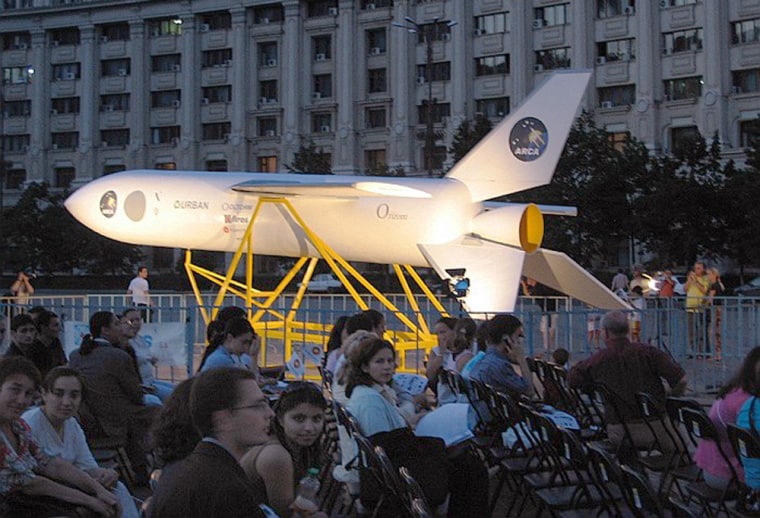A fledgling aerospace company in Romania, spawned by the $10 million X Prize competition for private spaceflight, says it has won a government contract in its home country and also has forged a partnership with a Canadian-American rocket venture.
Friday's announcements serve to raise the profile of the Aeronautics and Cosmonautics Romanian Association, or ARCA, which successfully fired off a demonstrator rocket more than a year ago but fell far short of winning the X Prize.
ARCA's new partner is PlanetSpace, which is developing the Canadian Arrow suborbital rocket with support from Indian-American backer Chirinjeev Kathuria.
"By joining forces with one of the leaders in private space exploration, we are certain that we will succeed in creating a reliable and efficient technology, as well as other exciting spaceflight projects," ARCA President Dumitru Popescu said in an announcement released by PlanetSpace.
In a telephone interview, Kathuria told MSNBC.com that the partnership was "something we've been working on for a year."
Kathuria, a former backer of MirCorp who now serves as PlanetSpace's chairman, said his company would collaborate with ARCA on spacecraft technology and a joint suborbital space project. Further details, including technical specifications and the project timeline, would be announced early next year, he said.
Although Kathuria declined to provide specifics, he said the Romanian connection would be important to the company's future plans. "This partnership is going to allow us to do some very interesting things," he said.
Geoff Sheerin, who headed the Canadian Arrow team during the X Prize competition and is now PlanetSpace's president, said the cooperative venture would obey technology export regulations set by Canada's Controlled Goods Directorate. The restrictions are similar to those in force in the United States, he said.
Sheerin didn't expect the regulations to be much of a problem for the Canadian Arrow because it is based on 60-year-old V-2 rocket technology. "Our V-2 technology is not a controlled good," he told MSNBC.com.
PlanetSpace's test schedule
So far, PlanetSpace has focused on the preparations for testing the Canadian Arrow's escape tower system at a Canadian military test range on the shore of Ontario's Georgian Bay.
Sheerin said those tests would be delayed because he has decided to use solid rocket propellants as well as a hybrid propulsion system for the escape tower system. That would require a more extensive environmental assessment, he said.
"It will delay the launch schedule" for the tower test, Sheerin said. "I don't know how much yet."
He said the delay wouldn't necessarily have an impact on the overall timetable for offering passenger rides to the edge of space by mid-2007. The tower test is "decoupled" from other rocket development tasks, he said.
ARCA's new projects
ARCA, meanwhile, said in the PlanetSpace announcement that it has won a 12-month contract from the Research Ministry and Romanian Space Agency to develop a rocket system with military applications.
"The system is called STRACAAT, and it will be used to simulate an airborne target at high speeds [and] low altitudes, such [as] attack airplanes or helicopters," ARCA said.
The Romanian Space Agency's description of the project said the system would provide practice in "combating terrorist or classical aerial threats."
ARCA also said it was developing a new low-cost suborbital launch vehicle called Stabilo. Rocket engine tests were scheduled for March, with the first unmanned test launch to suborbital space altitudes — that is, in excess of 62 miles, or 100 kilometers — planned within 12 months.
